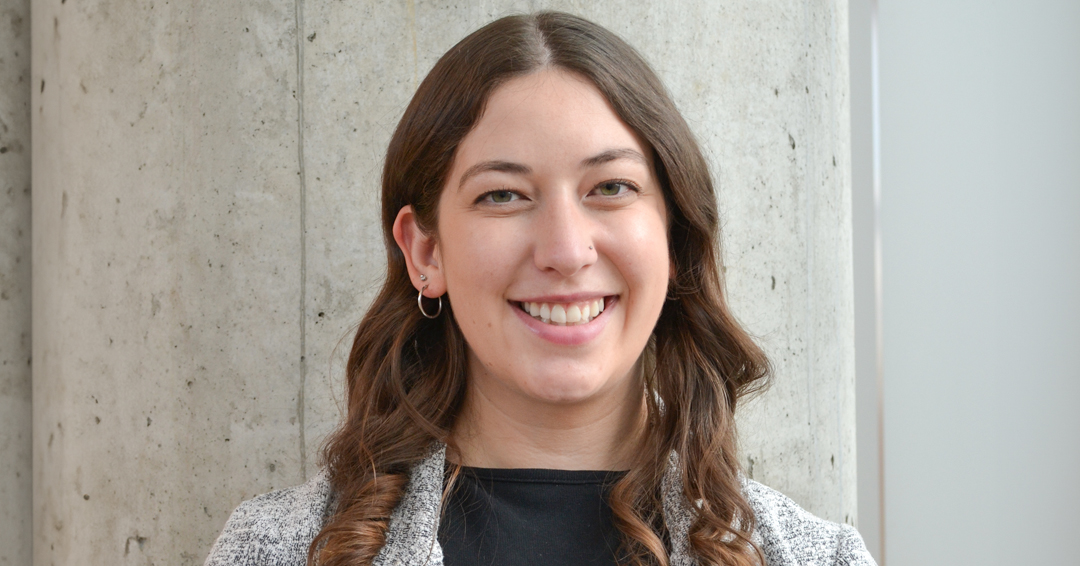
Part of our series: FMHS community members from away – The Faculty of Medicine and Health Sciences (FMHS) is made up of diverse communities, including people from across Canada and around the world. This series recognizes those from outside the province who have chosen to bring their talents and expertise to McGill University. Thank you for all that you contribute!
Traditionally thought of as practitioners who specifically treat the musculoskeletal system, physiotherapists today often find themselves delving into broader health issues as they formulate more holistic approaches to well-being.
According to Erin Keough, a physiotherapist with a Master of Science Applied Physical Therapy from McGill University who now works at Hôpital de Verdun, the holistic method entails viewing an injury from a broad perspective. “As physiotherapists, we work with the physical body but we have to understand that a human’s injury is more than just the physical elements, for example, a broken leg. Holistically, you have to look at how that impacts aspects of social, spiritual, and mental health.” Keough notes that her work is performed entirely in French.
Holistic methods can be used in practice to uplift and expand treatment options. “If I realize that a patient broke their leg a year ago and they’re not fully back yet and they want to get back into their recreation activities, that’s a perfect opportunity for me to refer them to a recreational therapist. Or, if they find their eating habits have changed, I’ll refer them to a nutritionist or a dietitian. There’s no way that I’m able to know everything in all of these realms — that’s why we are part of the allied professionals. But it’s always nice to see a patient knowing that you’re not just treating the leg, you’re treating the whole person,” Keough notes.
Holistic medicine’s reach extends to mental health. A holistic approach puts the patient, not simply their diagnosis or their symptoms, at the center of their treatment plan by addressing their emotional, mental, physical, and spiritual needs. “We take their information and then give them the resources to reach out to allied professionals such as psychiatrists, psychologists, or social workers, people who are trained in the mental health aspect. We’re able to look for red or yellow flags in mental health while we’re treating. In the past five years, there has been a lot more focus on wellness in a holistic point of view versus just the physical lens, and that entails mental health,” Keough points out.
Hailing from St. John’s, Keough attained a B.Rec in therapeutic recreation from Memorial University of Newfoundland where she also went on to complete a Master’s of Kinesiology. “I wanted to do kinesiology because I was very active in sports. When I took an intro to kinesiology course, I found I really resonated with therapeutic recreation because it was about how at the end of the day, if we don’t do our recreational activities or things that bring us joy, it takes away a lot of our quality of life.”
Keough, who describes herself as having “mixed Indigenous settler ancestry,” her mother being from a Labrador Inuit community and father from Ireland, was pleased to encounter the First Peoples’ House of McGill, where Indigenous students can connect with each other and their culture. “I am still navigating my Indigenous identity as someone who grew up away from the land and culture, and I’m actively working on deepening my relationship with the culture and family history,” she says.
The First Peoples House provides academic support, offering subsidized tutoring and monthly workshops. Cultural support is found in services aimed at promoting the cultural well-being of students. “It was a nice way to get connections. And they work with faculties too. In my faculty an occupational therapy professor created a document that has a lot of information on all of the educational points within the occupational therapy education of McGill, where you learn about Indigenous health and history, which is beneficial,” Keough points out. “In my last stage placement, I moved to Cree territory. There are internship placements that can be made available for anyone wanting to connect and gain experience working in an Indigenous region.”
Keough has extended her advocacy of holistic medicine to include a critique of how rehabilitation services are provided, focussing on inequalities inherent in the current health system. Her efforts led her to co-create ‘Justice Centered Rehab,’ a web-based social platform largely devoted to raising awareness of the challenges patients face when seeking health care.
“We talk about things that people don’t like to talk about, such as health, inequalities, social inequalities, why people can’t access care, the gaps in our system, all of these things. We’ve developed this group of like-minded individuals from all over the world, from Afghanistan, Nigeria, England, Pakistan, and the U.S., who come together once a month to discuss these issues. We have an Instagram and X page where we post on relevant topics, such as facilitating. Right now, we’re at the level of mostly awareness and bringing light to the fact that there are these discrepancies,” Keough explains.
With a proficiency in French and a successful career launch in tow, Keough says she is more or less in Quebec for good. “Montreal’s a big city compared to where I’m from. I arrived here in a cohort of about 10 out of province physiotherapists. Five of us stayed and we all lend support to each other. I also met my fiancé here, so I think I’m staying.”
